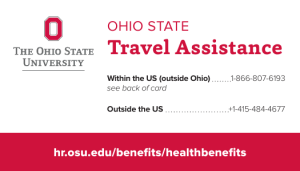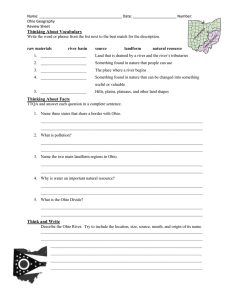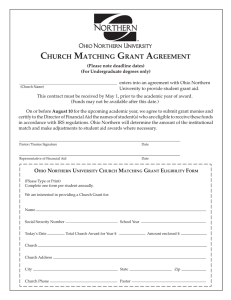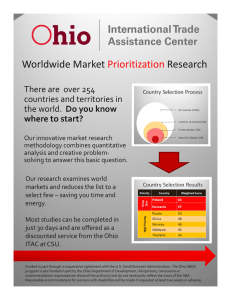Toxic Tort/Product Liability Alert Clearing The Docket: Ohio Appellate Court
advertisement
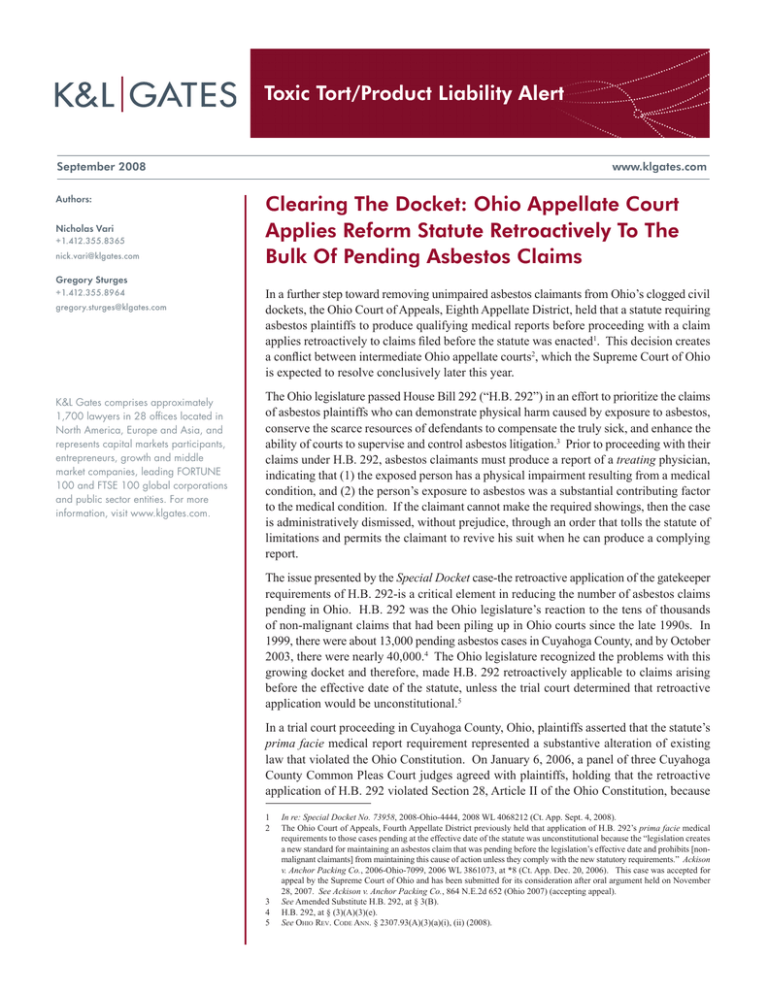
Toxic Tort/Product Liability Alert September 2008 Authors: Nicholas Vari +1.412.355.8365 nick.vari@klgates.com Gregory Sturges +1.412.355.8964 gregory.sturges@klgates.com K&L Gates comprises approximately 1,700 lawyers in 28 offices located in North America, Europe and Asia, and represents capital markets participants, entrepreneurs, growth and middle market companies, leading FORTUNE 100 and FTSE 100 global corporations and public sector entities. For more information, visit www.klgates.com. www.klgates.com Clearing The Docket: Ohio Appellate Court Applies Reform Statute Retroactively To The Bulk Of Pending Asbestos Claims In a further step toward removing unimpaired asbestos claimants from Ohio’s clogged civil dockets, the Ohio Court of Appeals, Eighth Appellate District, held that a statute requiring asbestos plaintiffs to produce qualifying medical reports before proceeding with a claim applies retroactively to claims filed before the statute was enacted1. This decision creates a conflict between intermediate Ohio appellate courts2, which the Supreme Court of Ohio is expected to resolve conclusively later this year. The Ohio legislature passed House Bill 292 (“H.B. 292”) in an effort to prioritize the claims of asbestos plaintiffs who can demonstrate physical harm caused by exposure to asbestos, conserve the scarce resources of defendants to compensate the truly sick, and enhance the ability of courts to supervise and control asbestos litigation.3 Prior to proceeding with their claims under H.B. 292, asbestos claimants must produce a report of a treating physician, indicating that (1) the exposed person has a physical impairment resulting from a medical condition, and (2) the person’s exposure to asbestos was a substantial contributing factor to the medical condition. If the claimant cannot make the required showings, then the case is administratively dismissed, without prejudice, through an order that tolls the statute of limitations and permits the claimant to revive his suit when he can produce a complying report. The issue presented by the Special Docket case-the retroactive application of the gatekeeper requirements of H.B. 292-is a critical element in reducing the number of asbestos claims pending in Ohio. H.B. 292 was the Ohio legislature’s reaction to the tens of thousands of non-malignant claims that had been piling up in Ohio courts since the late 1990s. In 1999, there were about 13,000 pending asbestos cases in Cuyahoga County, and by October 2003, there were nearly 40,000.4 The Ohio legislature recognized the problems with this growing docket and therefore, made H.B. 292 retroactively applicable to claims arising before the effective date of the statute, unless the trial court determined that retroactive application would be unconstitutional.5 In a trial court proceeding in Cuyahoga County, Ohio, plaintiffs asserted that the statute’s prima facie medical report requirement represented a substantive alteration of existing law that violated the Ohio Constitution. On January 6, 2006, a panel of three Cuyahoga County Common Pleas Court judges agreed with plaintiffs, holding that the retroactive application of H.B. 292 violated Section 28, Article II of the Ohio Constitution, because 1 2 3 4 5 In re: Special Docket No. 73958, 2008-Ohio-4444, 2008 WL 4068212 (Ct. App. Sept. 4, 2008). he Ohio Court of Appeals, Fourth Appellate District previously held that application of H.B. 292’s prima facie medical T requirements to those cases pending at the effective date of the statute was unconstitutional because the “legislation creates a new standard for maintaining an asbestos claim that was pending before the legislation’s effective date and prohibits [nonmalignant claimants] from maintaining this cause of action unless they comply with the new statutory requirements.” Ackison v. Anchor Packing Co., 2006-Ohio-7099, 2006 WL 3861073, at *8 (Ct. App. Dec. 20, 2006). This case was accepted for appeal by the Supreme Court of Ohio and has been submitted for its consideration after oral argument held on November 28, 2007. See Ackison v. Anchor Packing Co., 864 N.E.2d 652 (Ohio 2007) (accepting appeal). See Amended Substitute H.B. 292, at § 3(B). H.B. 292, at § (3)(A)(3)(e). See Ohio Rev. Code Ann. § 2307.93(A)(3)(a)(i), (ii) (2008). Toxic Tort/Product Liability Alert it requires “a plaintiff who filed his suit prior to the effective date of the statute to meet an evidentiary threshold that extends above and beyond the common law standard-the standard that existed at the time [the] plaintiff filed his claim.”6 On appeal, defendants argued that the prima facie showing under H.B. 292 is procedural and restates requirements that have long been recognized under Ohio law. In support of this position, defendants cited a recently decided Supreme Court of Ohio decision, Norfolk S. Ry. Co. v. Bogle, 875 N.E.2d 919, 923-24 (Ohio 2007), in which that court held H.B. 292 to be procedural in nature, at least for the purposes of federal preemption. In line with the defense position in the Special Docket matter, the Supreme Court in Bogle stated: 6 [T]he impact of these statutes [i.e. - H.B. 292] is to establish a procedural prioritization of the asbestos-related cases of the court’s dockets. Nothing more. Simply put, these statutes create a procedure to prioritize the administration and resolution of a cause of action that already exists. No new substantive burdens are placed on claimants, because Civ. R. 11 requires a party to certify, by signing a complaint, that there are “good ground[s] to support it.” 875 N.E.2d at 923. The Special Docket court relied heavily on Bogle in ruling that the retroactive application of H.B. 292 did not violate the Ohio Constitution. While the final chapter on this debate remains to be written, the Special Docket Court’s heavy reliance upon recent Supreme Court of Ohio precedent may, indeed, suggest a trend in favor of upholding the constitutionality of the retroactive application provision of H.B. 292. In re: Special Docket No. 73958, at 2-3 (Cuy. C.P. Jan. 6, 2006). K&L Gates comprises multiple affiliated partnerships: a limited liability partnership with the full name K&L Gates LLP qualified in Delaware and maintaining offices throughout the U.S., in Berlin, in Beijing (K&L Gates LLP Beijing Representative Office), and in Shanghai (K&L Gates LLP Shanghai Representative Office); a limited liability partnership (also named K&L Gates LLP) incorporated in England and maintaining our London and Paris offices; a Taiwan general partnership (K&L Gates) which practices from our Taipei office; and a Hong Kong general partnership (K&L Gates, Solicitors) which practices from our Hong Kong office. K&L Gates maintains appropriate registrations in the jurisdictions in which its offices are located. A list of the partners in each entity is available for inspection at any K&L Gates office. This publication/newsletter is for informational purposes and does not contain or convey legal advice. The information herein should not be used or relied upon in regard to any particular facts or circumstances without first consulting a lawyer. Data Protection Act 1998—We may contact you from time to time with information on K&L Gates LLP seminars and with our regular newsletters, which may be of interest to you. We will not provide your details to any third parties. Please e-mail london@klgates.com if you would prefer not to receive this information. ©1996-2008 K&L Gates LLP. All Rights Reserved. September 2008 | 2

